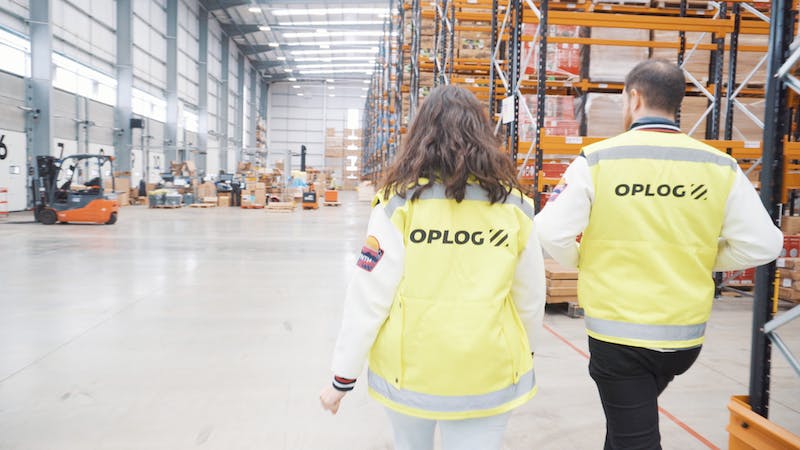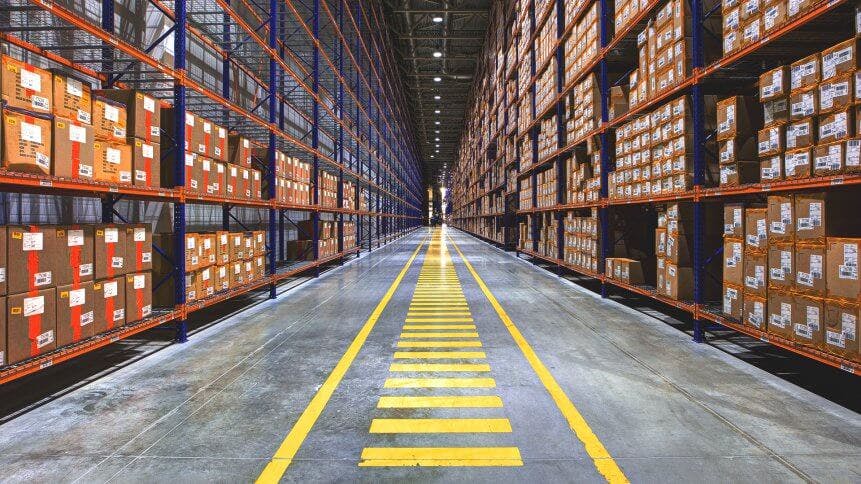Warehouses and fulfillment centers are often mistaken for each other, but they serve different purposes. Knowing the difference helps you optimize your storage and shipping processes, saving time and money. It also ensures you can meet customer demands efficiently, improving satisfaction and loyalty.
We explain the difference between a fulfillment center vs warehouse, helping you determine which is best for your eCommerce fulfillment needs.
What is a Warehouse?
A warehouse is a large facility used to securely store goods and materials. It is designed for long-term storage and usually holds inventory in bulk. Warehouses are essential for maintaining a steady supply of products and managing stock levels.
Common Types of Warehouses
There are different types of warehouses to suit various storage needs:
Public Warehouses
Public warehouses are available for rent by businesses. They are managed by third-party logistics (3PL) providers and offer flexible storage solutions without long-term commitments. These warehouses are ideal for small to medium-sized businesses that need temporary or scalable storage space.
Private Warehouses
Private warehouses are owned and operated by large companies for their own storage needs. These facilities are customized to fit their specific requirements and often incorporate advanced inventory management systems. Private warehouses provide greater control over storage conditions and inventory handling, making them suitable for businesses with consistent and high-volume storage needs.
Bonded Warehouses
Bonded warehouses are used for storing imported goods before customs duties are paid. These warehouses are operated under the supervision of customs authorities, ensuring compliance with import regulations. They are ideal for businesses dealing with international trade, as they allow goods to be stored duty-free until they are ready for distribution or sale.
Climate-controlled Warehouses
Climate-controlled warehouses are equipped with temperature and humidity controls to maintain optimal storage conditions. They are perfect for storing perishable items like food, pharmaceuticals, and sensitive electronics. These warehouses ensure that goods remain in good condition, preventing spoilage or damage caused by environmental factors.
Automated Warehouses
Automated warehouses utilize advanced technologies such as robotics, conveyor systems, and inventory management software. These systems streamline the storage and retrieval process, reducing human error and increasing efficiency. Automated warehouses are ideal for businesses looking to improve accuracy and speed in their eCommerce warehousing operations.
Distribution Centers
Distribution centers are specialized warehouses designed to receive, process, and ship products. Often confused with fulfillment centers, distribution centers focus on the bulk distribution of goods to retailers or other distribution points. Fulfillment centers are more customer-oriented, handling the entire order fulfillment process from picking to directly shipping orders to customers.
Warehousing Services
At a warehouse, you can expect to receive essential services such as inventory storage, where your products are kept safe and organized. Inventory management is also a key service, involving the tracking of stock levels and regular audits to ensure accuracy. They can also offer returns processing, where returned items are inspected and restocked if possible.
eCommerce Warehousing Services
An eCommerce warehouse is a storage facility specifically designed to handle online retail inventory. It differs from other types of warehouses by focusing on smaller, more frequent shipments directly to consumers rather than bulk distribution. Unlike a fulfillment center, which manages the entire order process, an eCommerce warehouse primarily handles storage and inventory management.
What is a Fulfillment Center?
A fulfillment center is a large facility that handles the entire order fulfillment process. This includes storing inventory, receiving orders, picking and packing products, shipping, and handling returns. Fulfillment centers are designed to streamline the process of getting products to customers quickly and efficiently.
Types of Fulfillment Centers
Fulfillment centers come in various forms, each designed to meet different business needs. Understanding the types can help you choose the right one for your operations.
eCommerce Fulfillment Center
An eCommerce fulfillment center is a specialized facility that manages the entire process of receiving, processing, and shipping online orders directly to customers. It focuses on efficient order fulfillment to ensure quick and accurate delivery. It can be used by one or more eCommerce businesses.
B2B Fulfillment Centers
B2B fulfillment centers specialize in processing and shipping large orders between businesses. They handle bulk shipments, ensuring that products reach retailers, wholesalers, or other businesses efficiently. These centers focus on meeting the unique needs of B2B transactions, such as handling large volumes and managing complex logistics.
Hybrid Fulfillment Centers
These combine traditional warehousing and fulfilment services, managing both long-term storage and order processing. They offer a comprehensive solution for various types of businesses that need both storage and fast order fulfillment.
eCommerce Fulfillment Center Services
An eCommerce fulfillment center offers a range of services to ensure efficient order processing and delivery of your products to your customers:
Order Processing
Order fulfillment is the main service of an eCommerce fulfillment center. It includes everything from receiving orders to packing to shipping. This comprehensive process ensures that your products are accurately and quickly prepared and sent for delivery to your customers.
To achieve this, eCommerce fulfillment centers use advanced inventory management systems to track stock levels and order details. They have efficient picking and packing methods to ensure orders are processed swiftly and correctly. They will also coordinate with shipping carriers to guarantee timely delivery, keeping your customers satisfied.
Inventory Management
Goods are usually sent from the warehouse to the fulfillment center, unless the fulfillment center offers long-term storage. When receiving products, the fulfillment center checks the items for accuracy and quality, updates inventory records, and stores the products in designated locations. This process ensures your inventory is accurately tracked and ready for order fulfillment.
eCommerce fulfillment centers can offer real-time inventory tracking, which allows you to monitor stock levels and movements. They also offer automated reordering to prevent stockouts and overstock situations. They will use advanced reporting tools to provide insights into inventory performance, helping you make informed business decisions.
Shipping and Logistics
One of the key differences between fulfillment centers and warehouses is shipping. Fulfillment centers focus on quickly processing and shipping individual orders directly to your customers. This ensures fast delivery times and enhances customer satisfaction.
Fulfillment centers often have partnerships with major carriers, allowing them to negotiate better shipping rates and pass these savings onto you. They also offer real-time tracking and updates, giving you and your customers visibility into the shipping process. By handling all logistics, they reduce the burden on your business.
Customer Service
Fulfillment centers prioritize customer service. They often work round the clock to ensure orders are picked, packed, and sent on time to your customers, ensuring their satisfaction and boosting your brand reputation.
The center will handle every aspect of your fulfillment process, including returns management. They process returns quickly and efficiently, updating your inventory and keeping your customers informed. This comprehensive service ensures a smooth and positive experience for your customers.
Fulfillment Center vs Warehouse: Which Do You Need?
Deciding between a fulfillment center and a warehouse depends on your business needs. Some businesses may require both to balance long-term storage with rapid order fulfillment. Consider your size, product type, and desired delivery speed to make the best choice.
Business Size and Inventory Turnover
If you have a small business with low inventory turnover, a fulfillment center might be all you need. Larger businesses with extensive product lines often benefit from using both a warehouse and a fulfillment center, unless the center also offers long-term storage.
Nature of Products and Storage Needs
Consider the type of products you sell and their storage requirements. If you sell B2B products that have longer storage needs due to seasonal demands, a warehouse is ideal. Fulfillment centers are better suited for eCommerce products that need to be shipped frequently to customers.
Order Processing and Delivery Speed
Fulfillment centers are designed for rapid order processing and quick delivery. If your business relies on fast shipping to keep customers satisfied, a fulfillment center is essential. Warehouses are less focused on immediate delivery and more on storing products until needed.
OPLOG Omnichannel Fulfillment Center
At OPLOG, our omnichannel fulfillment center seamlessly integrates all the technology and resources needed for your B2B and B2C operations. We expertly handle everything from inventory management to order processing and shipping, ensuring your operational processes are smooth and error-free. Receive all the operational support you need to streamline your fulfillment and boost your customer satisfaction.
FAQ






